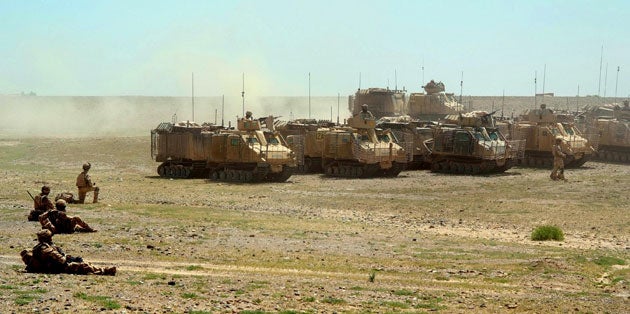Human Rights Act will hamper soldiers in action, warns MoD
Split-second decisions could be compromised by a ruling on the risks faced by frontline troops

The Ministry of Defence is bracing itself for defeat with a landmark court ruling tomorrow on whether Britain's soldiers, sailors and airmen should be protected under the Human Rights Act while they serve abroad.
If the judgment from one of the UK's most senior judges goes against the MoD, as some defence chiefs fear, it could force it to take greater care of troops fighting in Iraq and Afghanistan.
The MoD has repeatedly been criticised for the loss of life caused by poor equipment in both conflicts, including the use of poorly armoured Snatch Land Rovers, and the loss of 14 men in a Nimrod aircraft, later described as unairworthy.
Yesterday, the sixth British soldier to be killed in eight days in Afghanistan was named as Royal Marine Jason Mackie, 21, from Bampton, Oxford. He died after the Viking vehicle he was travelling in was destroyed by a roadside bomb. The MoD has ordered the removal of this vehicle from Afghanistan as it is too vulnerable to attack.
MoD officials are said to be deeply concerned that a ruling in favour of the Human Rights Act applying to soldiers serving abroad will damage their fighting effectiveness. They argue commanders making split-second decisions in the heat of battle may be paralysed by fear that their decisions will become the subject of legal actions.
Tomorrow, the Master of the Rolls, Sir Anthony Clarke will decide on an appeal by the MoD in the case of Private Jason Smith, 32, who died of heatstroke while billeted in a football stadium in Basra in 2003. An inquest heard that, with temperatures soaring to 60C in the Al Amarah stadium, there was neither air conditioning nor medical treatment, and the wrong medical advice was handed out.
Last year a court found that the Human Rights Act, which includes the right to life, should apply to soldiers serving abroad in a case brought by Pte Smith's mother, Catherine.
Tomorrow's decision could also have major implications for how inquiries are carried out. The MoD has been consistently criticised for failing to carry out proper investigations and blocking the release of information at inquests. Under the Human Rights Act, the Government would have to hold a full and open inquiry into the death abroad of any service personnel.
In March, the Equalities and Human Rights Commission, headed by Sir Trevor Phillips, intervened on Mrs Smith's behalf. During the hearing, John Wadham, the commission's group legal director, said: "This is not about an unreasonable expectation that the MoD will protect their life at all costs in a combat situation. It is about providing a good duty of care to them to ensure they remain as safe as possible."
Jocelyn Cockburn, Mrs Smith's solicitor, said the case was about the MoD taking "measures to prevent threats to life of which they could reasonably be aware".
Last year Mrs Smith said there had been no "disclosure at all" after her son's death. "Every day at the inquest we had to ask for things. They denied they had a report into his death, then when we finally got it, it was hopeless, because half the pages were missing and many of those left were blanked out. They went out there to help people. We expected that the army would look after them."
Tory MP Patrick Mercer, a former army commander, said the MoD had a point. "A commander in the field's job is to defeat the enemy with as few casualties as possible," he said. "But that commander has to make decisions about what equipment is effective. Sometimes kit maybe too heavy or too cumbersome to use effectively, and that's a judgement call which can't be hedged by fear of future legal action. I do understand that for the family that is a very difficult pill to swallow."
An MoD spokesman said: "This has never been about seeking to deny rights to our service personnel. The MoD has argued consistently that in the heat of battle on foreign territory, the UK could not secure the rights and freedoms which human rights legislation seeks to guarantee."
Join our commenting forum
Join thought-provoking conversations, follow other Independent readers and see their replies
Comments
Bookmark popover
Removed from bookmarks